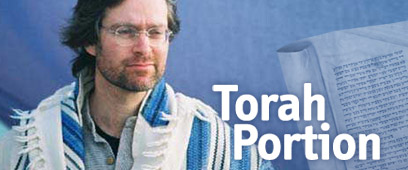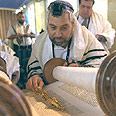

When was the last time you heard an Israeli politician say, I was wrong. Or even more dramatically, when was the last time you heard someone say "I know I am right but it doesn't matter because loving you is more important to me then being right.”
One of the deepest spiritual movements that a person can do is to "Give up being right.” We actually spend most of our lives proving to ourselves that "we were right.”
We replay old scenes time and again in our heads. For example, we go through all of the scenes that led up to the divorce and convince ourselves that we were right. Since we were right we were naturally entitled to act the way we did and therefore the responsibility for all the pain we caused others and ourselves lies with some else. With the person who was wrong. But not with us, because we were right. And then we die. Lonely. Unsatisfied. Alienated. But we tell ourselves; At least we know that we were right.
Brothers of Dinah take matters into their own hands
There is however a better way to live. It is not that Judaism believes in moral relativism and that there is not right and wrong. Although usually issues of right and wrong are far more complex then we make them out to be, there is a notion of right and wrong in the world.
However, often "being right" becomes an idolatry that we cling to desperately, in order to fill ourselves with a sense of worth. Worshipping at the altar of the false God of "being right," we often lose sight with divinities of love, forgiveness and compassion, which in fact are the only true qualities that can fill our lives with depth and meaning.
It is this powerful idea that is the hidden them of this week’s Parsha. The way this idea is subtly woven into the narrative is so gorgeous and profound that it almost takes your breath away. To grasp the full depth of it we need to go back several Parshiyot. Shechem Son of Chamor has raped Dinah daughter of Leah. The brothers bring this evil tiding to Jacob. Jacob hears their terrible report. But he does nothing.
The brothers of Dinah, particularly Shimon and Levi, sons of Leah, take matters into their own hands. They massacre the city of Shechem and free Dinah.
Jacob is angry at them. He says to them "Achartem Oti Lehavisheni BeYoshvei HaAretz". Biblical scholarship has correctly linked the word Achartem to its other usages in Tanach. Ahab says to Elijah "Is it you Ocher Yisrael". In this story in the book of Kings Ach-Av whose names means father and brother, represents the people.
Internalized their mother’s humiliation
Eliyahu, whose name is a combination of too many names of God, is in Ach-av's view loyal to his own confused understanding of God but not to the people - a situation all too familiar in contemporary spiritual leadership. The people are starving but Elijah is safe and nourished in his cave. He has lost his living connection to the people. For this reason Ach-av calls him an Ocher. An Ocher is one is not sensitive or has abandoned the needs of the community.
In a similar fashion, when Jacob calls Shimon and Levi Ochrim, he accuses them of ignoring the greater good of the community- the entire house of Jacob for the sake of the one. In effect Jacob is saying; know that I love Dinah as much as you do. I was silent not out of a lack of love.
However, sometimes you need to give up the needs of the individual for the sake of the community. Shimon and Levi respond by saying "Shall our sister be made a harlot". Usually this is understood as Shimon and Levi responding to Jacob by saying – we simply could not let Shechem treat our sister like a whore."
However a closer reading reveals that they are in fact not talking to Jacob but about Jacob. Vayomru Ish El Achiv; Jacob has finished offering his explanation why he did nothing to free and avenge Dinah, the brother say to each other about Jacob after he has walked away; "Will our sister be made a harlot." We will not let him – Jacob- turn our sister into a whore. They are angry at Jacob. Why? Because they feel that had Dinah been a child of Rachel and not Leah, Jacob might have reacted differently.
Rachel and her children are the true objects of Jacob's love
Remember we are talking about Shimon and Levi children of Leah. They have internalized their mother’s humiliation and anger towards Jacob. Jacob however says that they are wrong. I love all the children equally. It is just that I cannot risk the community for the sake of the one.
Who is right? Jacob or the sons of Leah? We do not know until this week's Parsha. And then it becomes crystal clear that the brothers are one hundred percent right. How do we know this? Very simple. In this week's Parsha once again there is a clash of interests between one of Jacob's children and the interest of the community. The viceroy of Egypt which we but not the brothers know to be Joseph has told them that he will give them nor more provisions if they do not bring their brother Benjamin to Egypt.
"The famine is heavy in the land (33:1).” They are out of food. The brothers seek to "Nichyeh Velo Namut (33:5)." Clearly the community's very life is threatened. And yet Jacob initially refuses to let Benjamin go to Egypt. This is a precise replay of the earlier Dinah story in which the danger to an individual is weighted against the danger to the community. Here however Jacob is willing to risk the community to protect the one.
This is precisely the opposite of his earlier position in the Dinah story. There is only one difference between the stories. Dinah is a child of Leah, and Benjamin is a child of Rachel. Rachel and her children are the true objects of Jacob's love. At this point it becomes clear to Judah- son of Leah- that they have been right all along. Jacob does love Rachel and her children more then Leah and her children.
Judah can now do one of two things with the clear knowledge that he and his brothers were right about Jacob all these years. He can hate Jacob and break off all contact with him. Or he can realize that he was right and then give up being right and accept Jacob for who he is with all his limitations. Similarly Judah, representing here the children of Leah can realize that their jealousy of Joseph son of Rachel is justified and they can take out their now validated anger on Benjamin.
Stage is set for reunion of Joseph and his brothers
Or they can give up being right- and give up the rightness of their jealousy and embrace the son of Rachel in love.
Judah chooses to give up being right and embrace both Jacob and Benjamin son of Rachel in love. He says to his father; let Benjamin come with us and "Anochi Eervenu Miyadi Tevavshenu." "I take responsibility demand him from my hand." This phrase is actually a paraphrase of Jacob himself. When Laban pursued Jacob who had left his house to return home to Canaan Laban accused Jacob of theft. Jacob faced Laban down in a dramatic speech, part of which was the words Anochi Achatenah Miyadi Tevakshena.
“I have taken responsibility –demand it from my hand" .This is Jacob in his greatness. This is before the great rift between Jacob and the children of Leah that occurs in Shechem. This is the father that Judah used to love before it all went bad. Thus Judah in using the exact same phrase- a phrase that only appears in the text in these two places- as his father Jacob in his moment of greatness.
In having Judah echo the words of his father at a moment of his fathers' greatness the text tells us that Judah has come home. He has reaccepted his father in love and so his father's words and courage can now resound from his throat. Similarly Judah in this speech embraces Benjamin as his brother with enormous power and pathos.
So much so that Jacob relents and allows Benjamin to travel with him to Egypt. In doing so the family is saved and the stage is set for the reunion of Joseph and his brothers. It is only once Judah realizes that he and his brothers were clearly right about Jacob and his preference for the children of Rachel, that he is able to give up being right and embrace Joseph and his father in love once again.
So too should it be for us.















